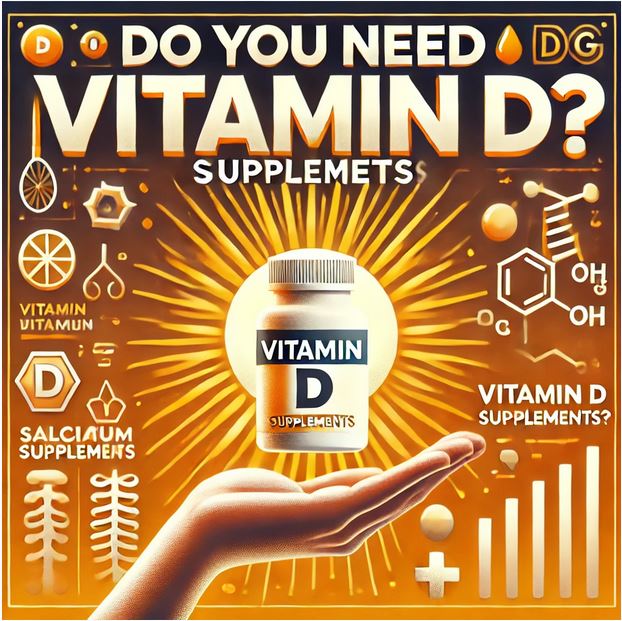Your Cart is Empty
Do You Need Vitamin D Supplements?
08 Feb, 2025 25

Do You Need Vitamin D Supplements?
Introduction
Vitamin D is often called the "sunshine vitamin," and for good reason—it’s produced by our skin in response to sunlight. However, in today’s world, many people don’t get enough sun exposure, leading to widespread vitamin D deficiency. This raises an important question: should you be taking vitamin D supplements? In this in-depth guide, we’ll explore the science behind vitamin D, its benefits, how to get it naturally, and whether supplements are necessary.
What Is Vitamin D?
Vitamin D is a fat-soluble vitamin essential for calcium absorption, bone health, and immune system function. Unlike most vitamins, it acts more like a hormone in the body.
How Is It Produced?
-
Sunlight: When ultraviolet B (UVB) rays hit your skin, your body synthesizes vitamin D.
-
Food sources: While few foods naturally contain vitamin D, some sources include fatty fish, egg yolks, and fortified dairy products.
-
Supplements: Available as vitamin D2 (ergocalciferol) and D3 (cholecalciferol), with D3 being more effective.
Signs and Symptoms of Vitamin D Deficiency
Vitamin D deficiency can lead to various health issues, including:
-
Weak bones and fractures (osteoporosis and rickets in children)
-
Muscle weakness and pain
-
Increased risk of infections
-
Depression and mood disorders
-
Fatigue and tiredness
Who Is at Risk?
-
People who live in northern latitudes
-
Those with darker skin (melanin reduces vitamin D production)
-
Individuals who use sunscreen regularly
-
The elderly (reduced ability to synthesize vitamin D)
-
People with malabsorption disorders (e.g., Crohn’s disease, celiac disease)
Health Benefits of Vitamin D
Vitamin D plays a crucial role in multiple bodily functions:
Bone Health
-
Helps the body absorb calcium and phosphorus.
-
Prevents osteoporosis and reduces the risk of fractures.
Immune System Support
-
Reduces the risk of respiratory infections.
-
May lower the likelihood of autoimmune diseases.
Mental Health and Mood Regulation
-
Linked to reduced risk of depression and anxiety.
-
Some studies suggest vitamin D can alleviate symptoms of seasonal affective disorder (SAD).
Heart Health and Cancer Prevention
-
May lower blood pressure and improve heart function.
-
Some studies indicate it could reduce the risk of certain cancers.
How to Get Vitamin D Naturally
Sun Exposure
-
Aim for 10-30 minutes of midday sun exposure several times a week.
-
People with darker skin may need more exposure.
-
Sunscreen can reduce vitamin D production but is necessary for skin protection.
Dietary Sources
-
Fatty fish (salmon, mackerel, sardines)
-
Egg yolks
-
Fortified dairy and plant-based milk
-
Cod liver oil
Do You Need a Supplement?
Who Might Need Supplements?
-
People living in areas with limited sunlight.
-
Individuals who spend most of their time indoors.
-
Those with medical conditions affecting absorption.
Choosing the Right Supplement
-
D3 (cholecalciferol) is more effective than D2 (ergocalciferol).
-
Recommended daily intake:
-
600 IU for adults up to 70 years old
-
800 IU for adults over 70
-
Higher doses may be needed in cases of deficiency.
-
Risks of Over-Supplementation
-
Excess vitamin D can cause hypercalcemia (high calcium levels), leading to kidney stones and heart issues.
-
Toxicity is rare but can occur with very high doses over time.
Vitamin D Myths and Misconceptions
Can You Get Enough from Food Alone?
-
Unlikely, as very few foods naturally contain vitamin D.
Does Sunscreen Block Vitamin D Production?
-
While sunscreen reduces production, you can still synthesize enough with moderate exposure.
Can You Overdose on Vitamin D from the Sun?
-
No, your body regulates production naturally.
Final Verdict: Should You Take a Supplement?
-
If you get enough sun exposure and eat a well-balanced diet, you may not need supplements.
-
Those at risk for deficiency should consider supplements, preferably under medical guidance.
-
Regular blood tests can help determine if you need supplementation.
Conclusion
Vitamin D is essential for overall health, and while some people can get enough naturally, many may benefit from supplementation. If you suspect you’re deficient, consult a healthcare professional to determine the best approach for maintaining optimal vitamin D levels.




